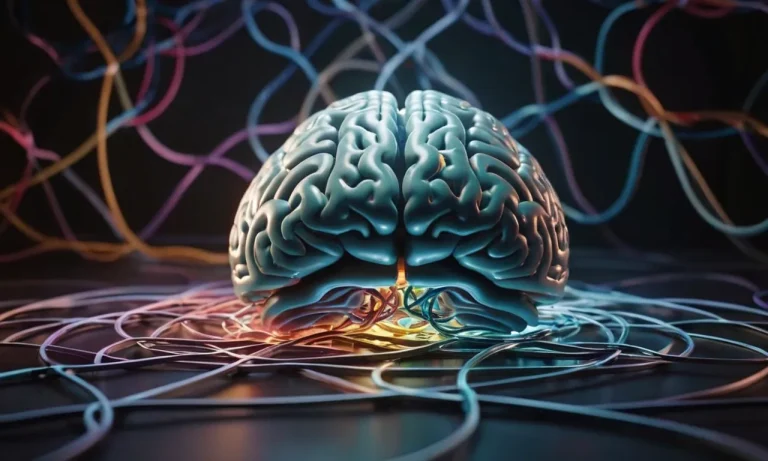What God Is Not: A Comprehensive Look At The Attributes God Does Not Possess
The nature of God is a complex subject that has been debated for centuries. Many people have misconceptions about the characteristics of God. In this article, we will examine common myths and clarify what God is not according to religious texts and scholarly perspectives.
If you’re short on time, here’s a quick answer to your question: God is not human, God does not have human limitations like a physical body or lack of knowledge. God is not contained in any one place and is not gendered.
We will analyze theological and philosophical arguments to gain a nuanced understanding of God’s nature and what attributes God does not have. This article will overview 5 key areas where popular assumptions about God may be inaccurate.
God Is Not Simply a Man or Human-like
God Does Not Have Human Limitations
Unlike humans, God is not limited in any way. He does not have restrictions of time, space, or knowledge that humans do. As an eternal being, God exists outside of time and is not subject to aging or death (GotQuestions.org).
He is omnipresent, meaning He can be everywhere at once, not confined to one location (1 Kings 8:27). God is also omniscient, possessing all knowledge, unlike our finite human understanding (Isaiah 40:28).
Additionally, God does not get tired or weary; He has inexhaustible strength and power (Isaiah 40:28-29). While humans struggle with weakness and limitations, God transcends these things completely.
Furthermore, God is self-sufficient and self-sustaining, not needing anything from anyone else (Acts 17:24-25). As Creator of the universe, He requires no one to take care of Him or provide for Him. Humans, on the other hand, are dependent creatures needing what He graciously gives us.
Ultimately, the limitations that affect humans do not apply to God because He operates on a power and plane of existence far above our own.
God Is Not Male or Female
While the Bible occasionally uses masculine pronouns to describe God, He is a Spirit without biological sex or gender (John 4:24; Numbers 23:19). God infinitely transcends male and female characteristics.
Scripture’s use of masculine language is meant to convey attributes of God like strength, care, and leadership over creation, not to assign Him a gender identity. Additionally, both male and female are equally made in God’s image (Genesis 1:27), so feminine descriptors can be appropriately applied to Him as well.
However, this does not mean God identifies as transgender, genderfluid or any other construct. As Creator of humanity and gender itself, He exists wholly apart from and unbound by any gender norms. While masculine or feminine metaphors help us understand God better, we must remember He remains far above and distinct from biological sex or gender roles.
God’s attributes infinitely outshine and transcend any human conceptions or limitations of male or female qualities.
God Is Not Contained in Any One Place
God’s Omnipresence Means He Is Everywhere
One of the unique attributes of God is that He is omnipresent, meaning He is fully present everywhere at the same time (Psalm 139:7-10). God does not have spatial limitations – His presence is not confined to any one location. There is no place in the universe that is devoid of God’s presence.
He transcends space and distance.
This is hard for us to fully comprehend, as humans are limited by space and distance. We can only be in one place at one time. But God is spirit (John 4:24), not confined by physical limitations. He is present across the entire universe simultaneously.
There is nowhere we can go to escape God’s presence (Psalm 139:7).
God’s omnipresence is a comfort to believers, as He is always with us wherever we go (Hebrews 13:5). But it also means that evil and injustice cannot be hidden from God’s view. His presence fills all things and all places. He sees all that transpires in every corner of His creation.
Heaven Is Not God’s Dwelling Place
Sometimes people mistakenly think of heaven as God’s dwelling place, as if He is contained or limited to heaven. But scripture makes it clear that God cannot be confined or localized in any location.
When Solomon built the temple in Jerusalem, he acknowledged in his prayer that the heavens could not contain God, let alone the temple he had built (1 Kings 8:27). Heaven itself cannot contain or limit God’s presence.
Even when scripture speaks of God being “seated on His throne in heaven” (Psalm 11:4), this is symbolic language indicating His supreme authority and sovereignty over all things. He transcends the created physical universe. As author R.C.
Sproul wrote, “Heaven is not where God lives, but where we will live with Him.”
Our eternal destiny as believers is to be in God’s presence in the new heavens and earth (Revelation 21:3). But we err if we think of heaven as God’s dwelling place. He fills all of creation and cannot be confined or localized. His omnipresence means He is everywhere and in all places at once.
God Does Not Change
God’s Nature and Truth Are Constant
One of the most foundational attributes of God is that He does not change (Malachi 3:6). God’s nature, character, truth, and promises do not fluctuate. He is the same yesterday, today, and forever (Hebrews 13:8).
While humans tend to change their thinking, plans, and commitments, God does not deviate in any way from who He is and what He establishes as true.
Here are some key reasons God does not change:
- God’s nature is perfect, so change would only make Him less perfect.
- God’s truth stands firm forever, so altering it would undermine His faithfulness and trustworthiness.
- God’s plans are set from eternity past, so adjusting them would call His wisdom into question.
- God’s promises are rock solid, so reneging on them would compromise His integrity.
In a world of shifting standards, moral relativism, and situational ethics, God is the steadfast rock. His character and revealed truth provide an anchor for our faith. Unlike people, God will never let us down or fail to fulfill His word.
God Does Not Learn or Grow
Another misconception some have about God is that He progresses in knowledge or maturity. But an all-knowing, all-powerful, and all-wise God does not need to learn or grow. He has no deficiencies that require improvement.
Consider these reasons God’s knowledge and wisdom do not increase:
- God has perfect omniscience, knowing all things actual and possible.
- God has perfect self-awareness and self-knowledge.
- God has perfect understanding of all His creation.
- God has perfect comprehension of the past, present, and future.
Additionally, God does not grow in character. Qualities like love, justice, patience, kindness, and faithfulness have no room for improvement in an all-loving, all-just, maximally patient, perfectly kind, and completely faithful God. He is the pinnacle of every positive attribute.
While humans may increase in knowledge and grow in wisdom and character throughout life, God has eternally possessed maximal levels. He does not progress – He has always been complete. His perfection leaves no room for growth.
God Is Not the Author of Evil
When discussing who God is, it is just as important to understand what He is not. One key attribute that God does not possess is that He is not the author or creator of evil. Scripture makes it clear that God is entirely good and only does what is right (Psalm 25:8; Nahum 1:7).
However, evil undeniably exists in this world. So where does it come from if not from God?
God Only Does Good
The Bible explicitly states that God cannot be tempted by evil nor does He tempt anyone (James 1:13). Everything God does is righteous and just (Psalm 145:17). He is light and in Him there is no darkness at all (1 John 1:5).
The Lord tests no one with evil, but rather leads us away from wickedness (Proverbs 15:9-10). While God does allow evil to occur through the free will He has given humans, He only permits it for good purposes and never causes moral evil Himself.
In contrast to God’s moral perfection, the devil is the father of lies and seeks only to steal, kill and destroy (John 8:44; 10:10). Satan rebelled against God and tempted the first humans to disobey as well, bringing sin and death into the world (Genesis 3).
So while God is not responsible for originating evil, He has defeated it through Christ and will fully eradicate it in the age to come (1 Corinthians 15:54-57).
Evil Arose Through Free Will
God created mankind and angels with free will, giving them the ability to choose between good and evil. He did not make them as robots who only followed His commands. Unfortunately, Satan and humans have used their freedom to rebel and commit wicked acts that were not in God’s original design.
But God in His sovereignty has taken even evil intents and turned them around for good purposes (Genesis 50:20; Romans 8:28).
Without free will, virtues like love, kindness, justice and mercy would not be possible. So despite the suffering that has resulted, God deemed it ultimately worthwhile to grant moral creatures the ability to choose, even knowing they might go astray.
He remains in control though, actively working to redeem the situation. In the end, God’s sovereign plan will culminate in the elimination of evil once and for all (Revelation 21:4).
God Is Not Separate From Creation
God Sustains All Things
God is intimately involved with His creation and sustains all things by His power (Hebrews 1:3). This world is not like a wound-up clock that God made long ago and left to tick on its own. Rather, the Bible tells us that in God we “live and move and have our being” (Acts 17:28).
Without God, we would vanish into nonexistence. As Paul proclaimed in Athens, God gives everyone “life and breath and everything else” (Acts 17:25). Truly, He upholds the universe by His divine power and sustains all things.
This truth challenges the common notion that the material world operates independently from God according to fixed laws of nature. Scripture reveals that God is the author and sustainer of all natural laws.
As the physicist-turned-theologian John Polkinghorne explained, the laws of physics seem to have been remarkably “tuned” so life can exist in our universe – evidence of a Creator who desires relationship with His creation.
The World Is Not Outside God’s Control
If God sustains all things, it follows that nothing in creation lies outside His sovereign rule and governance. As the psalmist proclaimed, “The earth is the LORD’s, and everything in it, the world, and all who live in it” (Psalm 24:1). God exercises complete authority over all He has made.
This truth contradicts the idea that the world operates independently of God, almost as if things have spun out of control. While we may not understand all God allows to happen, we can trust that He remains in charge. As C.S. Lewis memorably stated, “Nothing is yet in its true form.”
Behind the scenes, God is weaving all things together for the glorious story He is telling in human history, a story that climaxes with the victory of Jesus over sin and death.
Conclusion
This examination of God’s nature helps dismantle misguided assumptions. God is not a man, bound by human constraints. God transcends space and gender. God is unchanging, wholly good, and intimately involved in creation.
While God is beyond full human comprehension, analyzing what God is not brings us closer to truth. This exploration of the attributes God does not possess leads to deeper awe, faith and understanding.








